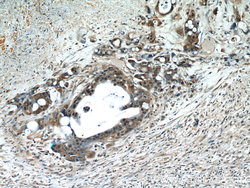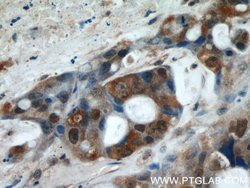Antibody data
- Antibody Data
- Antigen structure
- References [7]
- Comments [0]
- Validations
- Western blot [1]
- Immunohistochemistry [2]
Submit
Validation data
Reference
Comment
Report error
- Product number
- 16257-1-AP - Provider product page

- Provider
- Proteintech Group
- Proper citation
- Proteintech Cat#16257-1-AP, RRID:AB_10852962
- Product name
- GGCT antibody
- Antibody type
- Polyclonal
- Description
- GGCT antibody (Cat. #16257-1-AP) is a rabbit polyclonal antibody that shows reactivity with human, mouse, rat and has been validated for the following applications: IF, IHC, IP, WB,ELISA.
- Reactivity
- Human, Mouse, Rat
- Host
- Rabbit
- Conjugate
- Unconjugated
- Isotype
- IgG
- Vial size
- 20ul, 150ul
Submitted references Myc upregulates Ggct, γ-glutamylcyclotransferase to promote development of p53-deficient osteosarcoma.
Identified γ-glutamyl cyclotransferase (GGCT) as a novel regulator in the progression and immunotherapy of pancreatic ductal adenocarcinoma through multi-omics analysis and experiments.
Unbalanced redox status network as an early pathological event in congenital cataracts.
Interaction of MRPL9 and GGCT Promotes Cell Proliferation and Migration by Activating the MAPK/ERK Pathway in Papillary Thyroid Cancer.
Integrated application of transcriptome and metabolomics reveals potential therapeutic targets for the polarization of atherosclerotic macrophages.
Taurine treatment prevents derangement of the hepatic γ-glutamyl cycle and methylglyoxal metabolism in a mouse model of classical homocystinuria: regulatory crosstalk between thiol and sulfinic acid metabolism.
Identification of proteins responsible for adriamycin resistance in breast cancer cells using proteomics analysis.
Ueno T, Otani S, Date Y, Katsuma Y, Nagayoshi Y, Ito T, Ii H, Kageyama S, Nakata S, Ito K
Cancer science 2024 Sep;115(9):2961-2971
Cancer science 2024 Sep;115(9):2961-2971
Identified γ-glutamyl cyclotransferase (GGCT) as a novel regulator in the progression and immunotherapy of pancreatic ductal adenocarcinoma through multi-omics analysis and experiments.
Zheng Y, Xiong Q, Yang Y, Ma Y, Zhu Q
Journal of cancer research and clinical oncology 2024 Jun 25;150(6):318
Journal of cancer research and clinical oncology 2024 Jun 25;150(6):318
Unbalanced redox status network as an early pathological event in congenital cataracts.
Bejarano E, Whitcomb EA, Pfeiffer RL, Rose KL, Asensio MJ, Rodríguez-Navarro JA, Ponce-Mora A, Canto A, Almansa I, Schey KL, Jones BW, Taylor A, Rowan S
Redox biology 2023 Oct;66:102869
Redox biology 2023 Oct;66:102869
Interaction of MRPL9 and GGCT Promotes Cell Proliferation and Migration by Activating the MAPK/ERK Pathway in Papillary Thyroid Cancer.
Zhang HM, Li ZY, Dai ZT, Wang J, Li LW, Zong QB, Li JP, Zhang TC, Liao XH
International journal of molecular sciences 2022 Oct 9;23(19)
International journal of molecular sciences 2022 Oct 9;23(19)
Integrated application of transcriptome and metabolomics reveals potential therapeutic targets for the polarization of atherosclerotic macrophages.
Shen L, Li H, Chen W, Su Y, Yu J, Chen M, Shu G, Qiao E, Guo X, Xu M, Xia S, Zhao Z, Lu C, Ji J
Biochimica et biophysica acta. Molecular basis of disease 2022 Dec 1;1868(12):166550
Biochimica et biophysica acta. Molecular basis of disease 2022 Dec 1;1868(12):166550
Taurine treatment prevents derangement of the hepatic γ-glutamyl cycle and methylglyoxal metabolism in a mouse model of classical homocystinuria: regulatory crosstalk between thiol and sulfinic acid metabolism.
Maclean KN, Jiang H, Aivazidis S, Kim E, Shearn CT, Harris PS, Petersen DR, Allen RH, Stabler SP, Roede JR
FASEB journal : official publication of the Federation of American Societies for Experimental Biology 2018 Mar;32(3):1265-1280
FASEB journal : official publication of the Federation of American Societies for Experimental Biology 2018 Mar;32(3):1265-1280
Identification of proteins responsible for adriamycin resistance in breast cancer cells using proteomics analysis.
Wang Z, Liang S, Lian X, Liu L, Zhao S, Xuan Q, Guo L, Liu H, Yang Y, Dong T, Liu Y, Liu Z, Zhang Q
Scientific reports 2015 Mar 30;5:9301
Scientific reports 2015 Mar 30;5:9301
No comments: Submit comment
Supportive validation
- Submitted by
- Proteintech Group (provider)
- Main image

- Experimental details
- human brain tissue were subjected to SDS PAGE followed by western blot with 16257-1-AP(GGCT antibody) at dilution of 1:800
- Sample type
- tissue
Supportive validation
- Submitted by
- Proteintech Group (provider)
- Main image

- Experimental details
- Immunohistochemical of paraffin-embedded human liver cancer using 16257-1-AP(GGCT antibody) at dilution of 1:50 (under 10x lens)
- Sample type
- tissue
- Submitted by
- Proteintech Group (provider)
- Main image

- Experimental details
- The GGCT antibody from Proteintech is a rabbit polyclonal antibody to a recombinant protein of human GGCT. This antibody recognizes human, mouse, rat antigen. The GGCT antibody has been validated for the following applications: ELISA, WB, IHC analysis.
 Explore
Explore Validate
Validate Learn
Learn Western blot
Western blot ELISA
ELISA